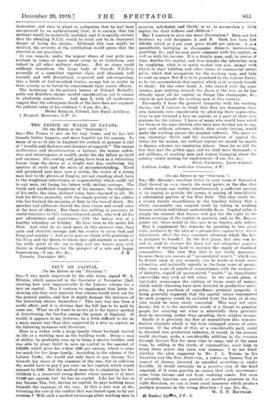[TO THE EDITOR OF THE " SPECTATOR."]
SIR,—Mr. Briscoe's excellent letter in your issue of Novembet 22nd showed up very clearly the weak points in the idea that a whole nation can realize simultaneously a sufficient portion of its capital to provide the means of paying off immediately a substantial portion of the War Debt. The idea really has a strong family resemblance to the familiar fallacy that a whole community can support itself by taking in washing because certain individuals undoubtedly do so. Capital value is simply the amount that buyers will pay for the right to the future earnings of the capital in question, and, as Mr. Briscoe points out, there would in this case be no buyers, only sellers.
May I supplement his remarks by pointing to two great evils, produced by the idea of a prospective capital levy, which injuriously affect the very economic situation which the levy is designed to benefit ? In the first place, this idea can be, and is, used to obscure the stern but not altogether popular necessity of working hard to increase the supply of standard commodities. The view that this is not really necessary, because there are masses of " accumulated wealth " which can be drawn upon at any moment, can be made- so much more attractive, and naturally appeals to the large mass of people, who, from want of practical acquaintance with the economics of industry, regard all accumulated "wealth" as immediately convertible into cash at full value. In the second place, it inevitably encourages the sinking of large sums of money, which would otherwise have been invested in productive enter- prise, in the purchase of superfluous personal property, it being generally supposed that the capital values represented by such property would be excluded from the levy, or at any rate would be more easily concealed. This may not seem heroic, but it is the inevitable result of a threat to penalize people for carrying out what is admittedly their patriotic duty by investing, rather than spending, their surplus income.
Surely it is precisely the flow of expenditure into non-pro- ductive channels which is the true untapped source of extra revenue. If the whole of this, or a considerable part, could be diverted into productive industry, it would, in tlse present world shortage, make a considerable addition to the revenue through Income Tax for some time to come, and at the same time, by adding to the stocks of commodities, must help to bring down prices and raise real incomes. I do not know whether the plan suggested by Mr. J. A. Hobson in his Taxation and. the New State—viz., a rebate on Income Tax in respect of income invested in specified securities—is really feasible. It would certainly be a positive step of the kind required, if it were possible to ensure that such investments came from income and not from realizing assets. But even if scientific taxation can provide no positive pressure in the right direction, we can at least avoid measures which produce positive pressure in the wrong direction.—I am, Sir, &c.,






































 Previous page
Previous page